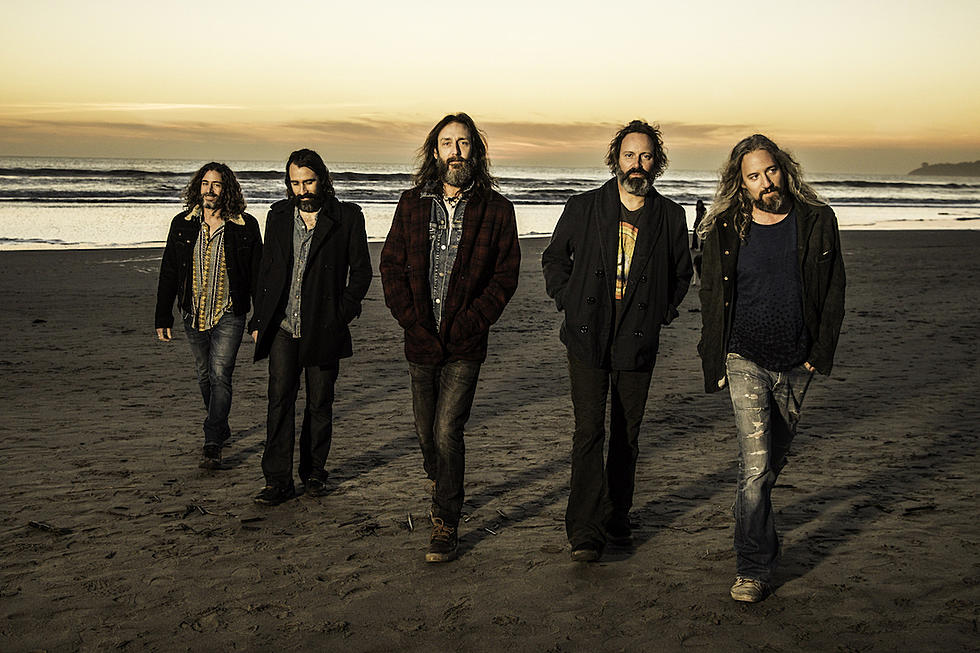
24 Years Ago: The Black Crowes Preach the Gospel of the ’70s With ‘Southern Harmony’
What makes an album alternative? The Black Crowes were MTV darlings almost from the moment their five million selling debut, Shake Your Money Maker, dropped in 1990. That album spawned hit singles, too, and the ensuing tour saw the Crowes open for the likes of ZZ Top and Mötley Crüe. That doesn't do much for your indie cred.
But May 1992 provided a unique moment in rock history. Grunge had successfully melded punk and metal while the Red Hot Chili Peppers' mashup of funk and metal had finally gone mainstream courtesy of Blood Sugar Sex Magik. Just a couple of years earlier, both Jane's Addiction and Nine Inch Nails cooked up unique brews of post-punk and (you guessed it) metal.
The dominant theme at the major labels seemed to be "out with the old, in with the new." It was one of those moments that comes along once per generation when the music industry sheds its tired skin and reemerges as a fresh new beast, tattooed and pierced and sporting new Doc Martens. Even recording itself was evolving as digital technology invaded the studio's sacred space. Tape hiss and signal noise had no place beneath the shiny reflective surface of the sterile compact disc.
But all of that meant absolutely nothing to the Black Crowes when they entered "recording studios in the United States" (as stated in the liner notes) to begin work on their second album, The Southern Harmony and Musical Companion.
By the time they finished recording, the Crowes had incorporated every single move from bands like the Faces, Humble Pie and the Mick Taylor-era Rolling Stones. Southern Harmony couldn't have been more out of step with the prevailing musical fashions of '92, and if that isn't alternative we don't know what it is. Even the title was mildewed and dusty, borrowed from a hymnal published in 1835. But when the album opens with "Sting Me," it's suddenly 1973.
The audible buzz of old amps at the beginning of the song sets the tone for the album, then the hand claps, organ, tambourines, cowbell, maracas and gospel chorus instantly put the Black Crowes in the realm of great '70s albums like the Stones' Gimme Shelter, David Bowie's Young Americans and even Pink Floyd's Dark Side of the Moon.
And then comes "Remedy" – the greatest Exile-era Stones song the Stones never recorded. Rich Robinson lays down a riff that even "Keef" would've been proud to call his own and Eddie Harsch's honky tonk piano follows along. You can almost hear Chris Robinson's velvet trousers rubbing together in the vocal booth. It's the kind of souldful, chill-inducing rock that had been missing from the radio since Rod Stewart left the Faces. When Harsch's organ run kicks in at 3:40, guiro providing a Stonesy bit of percussion, there's nothing to do but surrender to the retro brilliance of it all.
Then we're off to "Thorn In My Pride" and the softer side of the '70s. Robinson opens the track with a beautiful acoustic guitar figure while Harsch comes in with an organ run that would've been fit neatly on Rod the Mod's "Tonight's the Night." Track sequencing was essential before digital files returned us to a singles-dominated music industry, and the Crowes (along with producer George Drakoulias) learned their lessons well. All of the tension built up by "Remedy" is eased over the course of Chris Robinson's ensuing ode to his angels and devils.
"Bad Luck Blue Eyes Goodbye" is the kind of bluesy ballad that brings out the Bic lighters. You instantly imagine the dangerously thin singer seated on a stool, bathed in a single spotlight or strolling across the lip of the stage, shaking hands and taking flowers from sunburned girls in halter tops who've waited all day. Then the houselights rise for the chorus and the crowd sings along through teary eyes, "sometimes a memory only sees what it wants to believe." The only one way the song can end is with an agonized James Brown wail, and Robinson delivers on cue.
Then the Crowes usher us away to church with "Sometimes Salvation." Robinson testifies, "To lessen my troubles, I stopped hanging out with vultures and empty saviors like you," while drummer Steve Gorman rides the crash within an inch of its life. Maybe its a metaphor, or maybe it just sounds right. It doesn't matter. It's Muscle Shoals at the dawn of the digital age.
The tambourine returns on "Hotel Illness," joined by Chris Robinson's harmonica and a 4/4 beat so steady you could land a plane on it in the middle of a hurricane. Robinson delivers what might be the best line of his entire career in this one: "I've got a head full of sermons and a mouth full of spiders." It's sacred and profane, beautiful and – everything you need to know about the Black Crowes in one lyric.
The talk box from "Rocky Mountain Way" and other '70s staples is used to great effect on "Black Moon Creeping" – a funky stomper bound to get the most stubborn heads bobbing. "No Speak No Slave" is all riffs and auxiliary percussion as the Robinson brothers swap vocal and guitar licks like it's a battle for the heart of the band. And, in retrospect, it might have been.
The '70s pastiche wouldn't be complete without some tasty slide guitar, and Robinson brings it on "My Morning Song." But there's that rhythm section. Johnny Colt's bass is locked into the thunderous beating that Gorman gives his drum kit. While the spotlight was on the Robinson brothers from the beginning, the Crowes always featured a rock steady rhythm section – not to mention Marc Ford's tasty lead guitar lines. This was a band in every sense of the word.
And speaking of rock steady, the Black Crowes pulled one more mandatory move in the classic rock playbook: the reggae cover. They went with Bob Marley's "Time Will Tell" and it's a perfect choice to close an album so evocative of bluesy gospel filtered through the lens of the American south.
When the Crowes released The Southern Harmony and Musical Companion, it was a monster and went on to top the Billboard 200. They didn't crack the Top 10 again until 2008 with Warpaint but, by then, album sale charts had hardly become a measure of success. Like the Grateful Dead and other jam bands, the Black Crowes became a formidable touring force, and their live act is legendary not just for the music, but their volatility. But what made them so brilliant finally undid them in the end: the Robinson brothers finally broke up the band last year.
This Is Hardcore: The 50 Sexiest (and NSFW) Alternative Album Covers
More From The Moose 94.7 FM










